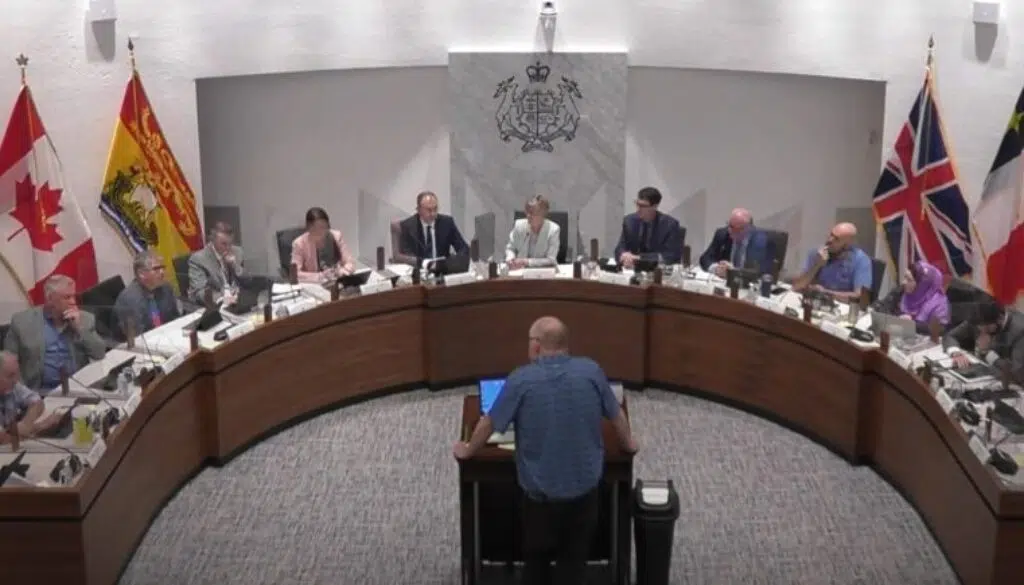A large home zoned for single-family use was granted a change in zoning status by Saint John City Council despite operating out of bounds of the existing zoning rules, in an evenly divided vote split by the mayor.
“I will support staff in this to see how this works out for us at the end of the day,” Mayor Donna Reardon said, voting in favour of the zoning change. “I do have concerns….which is the enforcement.”
“I think it would be a good idea for staff to come back to us and let us know how this whole thing is proceeding.”
The owners of 33 Birch Grove Terrace in Millidgeville converted the one-unit residential, R1-zoned home to three apartments in 2022 after living in the house for two years, without having the proper zoning in place.
The zoning application to switch to low-rise residential was denied by the Planning Advisory Committee over parking and enforcement concerns, but made its way to common council for another look after city staff recommended that not only could the site hold the three units housed on it already, it could go a high as four.
“The area comprises a variety of residential zones…the proposed low rise is still considered low density, but it would bring that third unit into compliance with the zoning bylaw, “ said Yeva Mattson of the city’s Growth & Community Services department.
“Staff are recommending a section 59 as well, which would limit further development to a maximum of four units.”
Mattson told council the four-unit limit would “create flexibility in the future, which would help align with the goals of the affordable action plan by permitting innovative housing models to expand the housing supply.”
Letters from neighbours both for and against the change expressed concerns with numerous vehicles parking on the street in the suburban cul-de-sac which is not on a bus route. The letters said snow plow services were having to modify their approaches to clearing the street, and they had concerns about other infrastructure and overall quality of life. There is only one way in or out of the street which terminates in a bulb out.
Two neighbours who attended the meeting in person pleaded with council to “follow the rules,” noting that the third unit, a backyard pool house built by the previous owners, had been approved because it was only for occasional use, not to be a full-time apartment. They noted that the owner had already moved out and the apartments had already been rented for several months before the zoning changes had been approved.
“I think the reason why we have this process is that we don’t have to zone all the properties on that street if we don’t want to, so that’s within this body’s control,” said councillor Paula Radwan who voted in favour of approving the zoning change. “The other things I couldn’t help keep in mind is supply and demand where we have a negative .5 [per cent] vacancy rate… and our homeless rate is up to 350. The need is there.”
“What’s before us isn’t three units, what’s before us is four units as a maximum. So that’s a concern for me in this one spot,” Councillor Gary Sullivan said, explaining his vote against the zoning change. “I certainly realize that zoning is changing and our city has to change. But then you’ve got to look to see if our infrastructure will support the changes.”
“This is certainly a neighbourhood with a short street with nine very large houses on it. And if we were conservative and capped them all if this became a neighbourhood of change and we had 36 units on that short little street…I just can’t imagine seeing it on that street,” he said, noting that if each unit had one or more vehicles, that parking and services like snow removal and garbage would be serious concerns.
Councillor Brent Harris supported the rezoning but warned other property owners on the street not to do what had been done at 33 Birch Grove Terrace.
“This is a warning to anybody on the street not to do it. It’s already built. They’re already collecting rents. You’re going to put two, three people on the street to tear it down?” he asked. “The second part is: We can’t make land use decisions based on failure to get compliance when we want. That’s just not how it works.”
Neither staff nor councillors made mention of a fine or other punishment for property owners operating in violation of zoning rules.
That stands in contrast to a ruling city council made in the past under similar circumstances.
In 2018 Thomas Construction was found to be extracting sand and gravel from land it owned, but which was not zoned for that use.
The company was also operating without a permit, however, company owner John Colwell told councillors that not only had he been paying his permit fees to the city without having them refunded or denied, but that the city had been one of his clients for the sand and gravel taken from the improperly zoned site.
City council denied Colwell’s application to rezone Thomas Construction’s land, it also issued a cease and desist letter regarding its gravel and sand operations.
“I think what council was clearly upset about tonight is that the operator, with the information we had, was operating without permits and operating in an area that they weren’t approved to operate in,” then-mayor Don Darling said after the zoning application was denied. “I think council sent a signal tonight that they’re displeased with that information.”
Alex Graham is a reporter with Huddle, an Acadia Broadcasting content partner.







